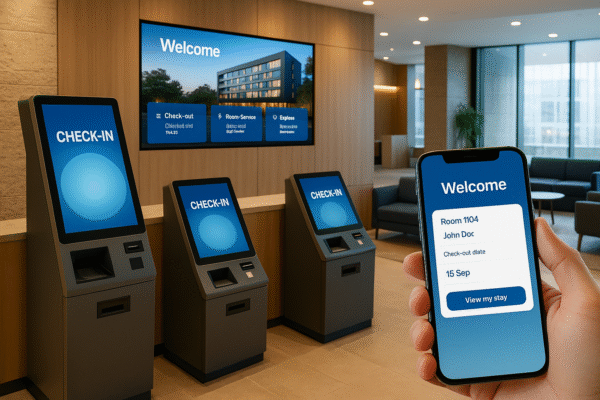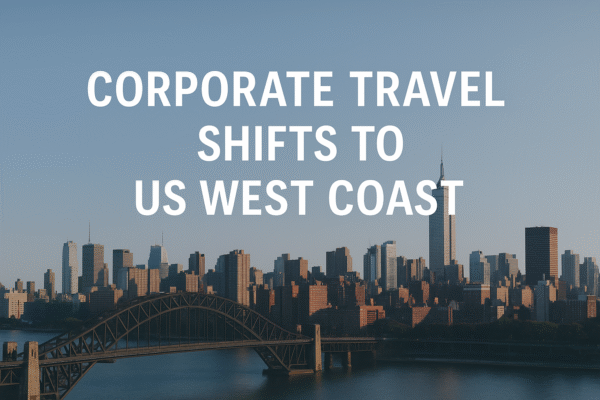In 2025, the landscape of corporate travel in the United States is undergoing a dramatic shift. Traditionally dominated by East Coast hubs such as New York, Boston, and Washington, the momentum has now swung toward the West Coast. California, Seattle, Silicon Valley, and Houston are emerging as the epicenters of business mobility, attracting executives, entrepreneurs, and project teams seeking longer, more flexible stays.
Recent data shows a 44 percent increase in corporate housing and serviced apartment bookings across the West Coast. This surge aligns with the rise of technology-driven industries, renewable energy projects, and global workforce mobility. Meanwhile, New York City has reported a decline of nearly 30 percent in corporate housing demand compared to last year, signaling a recalibration of priorities in the corporate travel market.
Technology and AI: Driving Business Travel Growth
Seattle and Silicon Valley, long recognized as global technology powerhouses, are now experiencing an unprecedented rise in corporate housing demand. Investments in artificial intelligence, machine learning, and data-driven enterprises are pulling talent into these regions, pushing year-on-year bookings to record levels.
The trend reflects a broader shift in corporate travel strategies. Businesses are not only sending teams for short-term meetings but relocating staff for mid- to long-term projects. This has transformed serviced apartments into a preferred choice, offering executives and specialists the flexibility, comfort, and efficiency required for extended assignments.
Further south, Houston is carving its place as a rising star in the corporate travel sector. With lower accommodation costs, favorable tax conditions, and a surge in serviced apartment options, the city has recorded a 58 percent increase in corporate bookings. Its growing role as a hub for both energy and technology highlights how cost efficiency and sector-specific growth drive travel demand.
APAC: Corporate Travel Expansion Across Technology Hubs
The Asia-Pacific region is also witnessing dynamic changes in corporate mobility. Singapore, while remaining a strong financial center, has seen a slight cooling in demand with a 10 percent drop in bookings compared to the previous year. In contrast, Taiwan has surged ahead, fueled by booming semiconductor and high-tech industries, with corporate travel demand rising by 600 percent.
Tokyo is also reporting strong growth, with a 154 percent increase in corporate housing occupancy this quarter. These figures underscore the growing role of Asia-Pacific cities in global business tourism, with technology innovation directly influencing accommodation and travel patterns.
Renewable Energy Spurs European Business Tourism
In Europe, renewable energy projects are reshaping traditional corporate travel flows. Coastal Spanish cities such as Bilbao, Valencia, and Zaragoza are experiencing a boom in corporate housing demand. Bilbao reported a 50 percent growth in bookings, Valencia surged by 380 percent, and Zaragoza’s demand quintupled.
These shifts are closely linked to large-scale solar and offshore wind projects. Engineers, consultants, and project managers are relocating for extended stays, transforming these coastal destinations into business tourism hubs. The trend highlights how sector-specific investment, particularly in renewable energy, creates ripple effects across travel and hospitality markets.
Middle East Growth: Dubai’s Rise as a Corporate Hub
Dubai continues to strengthen its global standing in corporate travel, securing a spot among the top five destinations for extended business stays. Demand for serviced apartments has increased by 65 percent, driven by professionals in finance, pharmaceuticals, and legal services.
The city’s modern infrastructure, strong connectivity, and reputation as a business hub make it attractive for relocation and long-term stays. Dubai’s growth underscores the Middle East’s increasing role in shaping the future of corporate mobility and tourism.
Serviced Apartments: The Preferred Choice for Executives
The growing prominence of serviced apartments is one of the clearest indicators of how corporate travel is evolving. Business travelers are increasingly opting for flexible accommodations that combine the convenience of hotel services with the comfort of home living.
Loyalty to established serviced apartment providers, consistent quality, and repeat stays are shaping booking decisions. Executives on long-term projects value the ability to live and work comfortably in accommodations designed for extended stays. For travel managers, serviced apartments also offer cost-effectiveness and streamlined relocation logistics, making them central to corporate mobility strategies.
Future Trends: Business Travel Beyond 2025
The data reveals a global redistribution of corporate travel demand, influenced more by industry growth than by traditional city hierarchies. The US West Coast, driven by AI advancements and energy investments, has firmly established itself as the leading growth hub.
At the same time, APAC technology centers, European renewable energy regions, and Middle Eastern business hubs like Dubai are rising as secondary nodes of demand. This multi-regional expansion illustrates how corporate travel in 2025 is defined by sectoral priorities, flexible accommodations, and global workforce mobility.
Looking ahead, serviced apartments are expected to remain the cornerstone of business tourism, providing the adaptability required in a fast-changing global economy. Companies will continue to prioritize destinations that balance cost efficiency, quality of living, and proximity to industry growth.
Conclusion: A Redefined Global Corporate Travel Map
Corporate travel in 2025 paints a new picture of business mobility. The West Coast of the United States has overtaken the East as the prime destination, supported by technology, AI, and renewable energy investments. Meanwhile, APAC, Europe, and the Middle East are redefining their roles through sector-specific growth and infrastructure development.
For the global travel industry, this transformation represents both opportunity and challenge. Destinations that can align their accommodation strategies with emerging business needs will thrive, while those that fail to adapt may see demand decline.
The future of business tourism lies in flexibility, sustainability, and innovation—and cities like Seattle, Silicon Valley, Houston, and Dubai are leading the way into this new era.
For more travel news like this, keep reading Global Travel Wire















